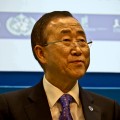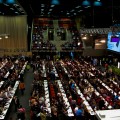Gender Agenda at COP17
Nagida Clark | November 30, 2011.
In a year of climate negotiations headed up by three women, expectations are high for Durban to deliver an outcome recognising the gender-sensitive impacts of climate change.

COP17 President Maite Nkoana-Mashabane opened this year’s UN climate negotiations with a nod to a topic often overlooked in discussions on climate change. While talks are all too frequently plagued by the buzz concepts of emissions trading, carbon capture and feed-in tariffs, President Nkoana-Mashabane chose instead to talk about women.
“We now have women leaders at the helm of this COP… It’s a very nice coincidence, so we will not miss this opportunity to make good use of this,” she said.
As a topic rarely mentioned by the mainstream press and entirely absent from the Kyoto Protocol, one could be forgiven for not realising that climate change does not carry uniform consequences for all genders. Women, in particular, are already being disproportionately affected by climate change, with this disparity set to worsen as the climate crisis intensifies.
COP17 itself has been brimming with gender-related activity. UN Women has formed a partnership with the Global Gender and Climate Alliance (GGCA), the Women’s Environment and Development Organisation (WEDO), Oxfam International and others. Gender equity is being strongly advocated as a key principle to be incorporated in any future climate agreements.
The need for this approach is clear. Women and girls commonly hold the responsibility of providing climate-dependent household resources such as food, water and fuel wood. A 2009 UNFPA report found “The poor are especially vulnerable to the effects of climate change, and the majority of the 1.5 billion people living on $1 a day or less are women”.
While gender considerations require implementation at all levels of policy development, the key areas of adaptation, technology transfer and finance have emerged as gender priorities of COP17.
The Green Climate Fund in particular presents a valuable opportunity to ensure gender-sensitive approaches to adaptation and financial distribution. The Draft Governing Instrument devised in Cancun last year contains five references to gender. Adopting these statements in Durban would be an important step towards addressing gender inequities both in the effects and solutions to climate change.
As the negotiations continue amid pressure from diverse lobby and interest groups, the songs of empowerment flowing from the Women’s and Gender Caucus yesterday suggest issues climate gender inequities will be difficult to ignore at COP17.












comment